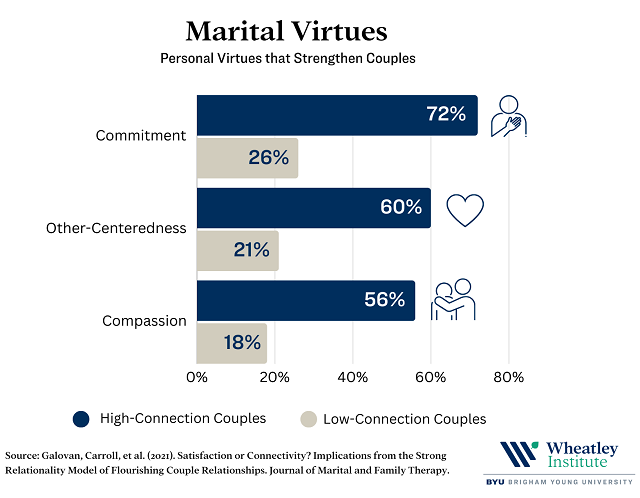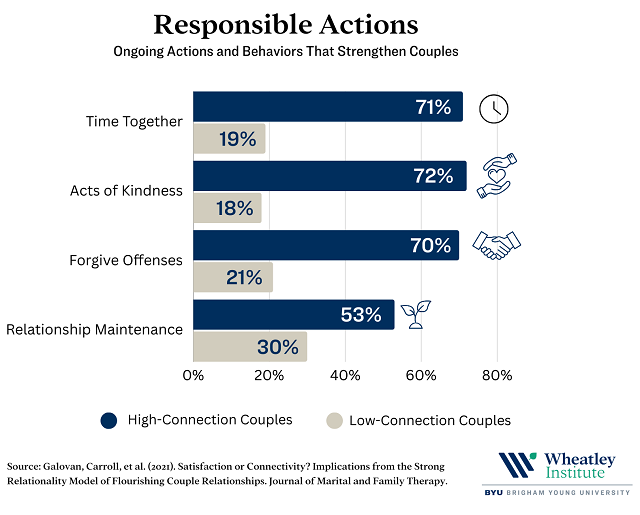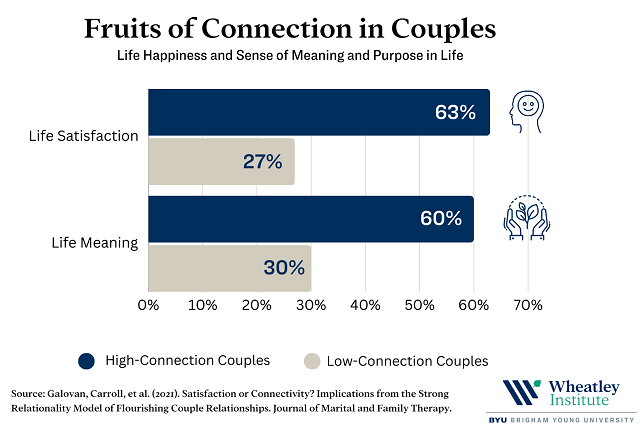Highlights
- Enduring connection in marriage results more from the intentional efforts of the spouses than it does from spontaneous love and emotional spark. Post This
- High-connection marriages have 3 times higher scores on proactive behaviors than low connection couples, specifically in spending meaningful time together (71% vs. 19%), doing acts of kindness for each other (72% vs. 18%), and forgiving offenses (70% vs. 21%). Post This
- Spouses in high-connection marriages score twice as high as spouses in low-connection marriages on life satisfaction (63% vs. 27%) and life meaning (60% vs. 30%). Post This
In an IFS blog post last year, we pointed out that an astonishing number of Americans continue to believe in the idea that they have a “one-and-only soulmate” waiting for them somewhere. A 2021 YouGov poll of nearly 15,000 U.S. adults found that 60% of respondents believe in the idea of soulmates, confirming that the quest to find one’s soulmate continues to play a significant role in our modern dating culture.
However, in a new report from the Wheatley Institute, we provide a deeper examination of the effects of soulmate thinking on the landscape of modern dating and marriage relationships. Specifically, we illuminate the ways that soulmate beliefs often diminish the significance of agency and intentional actions in healthy relationships—which makes loving and lasting marriages less likely to be formed and sustained. We also share some new findings from a recent study we published that finds that enduring connection in marriage relationships results more from the personal virtues and intentional efforts of the spouses, than it does from spontaneous love and emotional spark.
The Science Against Soulmates
One of the most enduring features of the scientific study of marriage over the last 70 years has been the use of measures of personal “marital happiness” or “relationship satisfaction” to assess the quality of a marriage. This has largely happened because most relationship researchers live in cultures that stress expressive individualism, a worldview that promotes self-expression and personal fulfillment as the highest aspirations of a life well lived. 1
If personal happiness is the ultimate outcome of marriage, then marriage will become a consumer good for individuals, evaluated and appraised through the lens of personal happiness. This view reinforces soulmate thinking in troubling ways.
To the degree that the social science of marriage is primarily focused on the personal satisfaction of the spouses, relationship experts may find themselves in the problematic position of not simply observing this cultural view of marriage, but rather promoting and encouraging it. Far too often, experts are throwing gasoline on the fire with our cultural obsession with relationship happiness rather than providing a fuller, more realistic account of marriage.
A New Model of Flourishing Marriages
The good news is that many relationship scholars are now testing new theoretical models of marriage that explicitly challenge the assumptions of expressive individualism – and by extension the soulmate model of marriage. 2 These new models emphasize how a shared history and couple identity make a marriage relationship an entity itself, and that flourishing marriages not only meet the basic human need for satisfaction, but also satisfy and promote the human need for safety, growth, meaning, and connection. As such, flourishing marriages include deeper elements such as personal virtues, life meaning and purpose, a sense of belonging, growth and improvement, and a couple identity that includes a sense of togetherness and permanence.
Our team has been developing and testing a new model of marriage quality we call the “Strong Relationality Model of Relationship Flourishing.” Arguing that relationship satisfaction is an insufficient indicator of relationship quality, we suggest that an additional construct that we call “relational-connectivity” may provide a more holistic vision of what constitutes true relationship quality. Relational-connectivity focuses on indicators of the strength of a couple’s relationship, rather than simply an individual’s sense of personal satisfaction from the relationship.
We also propose that personal virtues are a key factor that promote relational-connectivity. Due to the inherent relationship context of dispositional virtues such as commitment, compassion, and other-centeredness, these personal traits are essential in creating a flourishing bond in a relationship. Our model also proposes that dispositional virtues lead people to engage in responsible behaviors or proactive actions to strengthen their relationships, such as showing compassion to each other, spending meaningful time together, regularly engaging in acts of kindness, and participating in regular maintenance behaviors to improve their relationship.
A New Study of Flourishing Marriages
Recently, our team conducted a large-scale study designed to provide preliminary evidence for the value of the concept of relational-connectivity in comparison to relationship satisfaction. In a study of 615 couples (1,230 individuals) in the United States and Canada, we used a newly developed measure of relational-connectivity to test two aspects of the model.
First, we used the new measure to identify couples who are truly flourishing in their relationships and are connected, not just satisfied. Our measure of flourishing marriage evaluates three components of relational-connectivity: couples’ sense of belonging, friendship, and intimacy. Next, we then compared flourishing and non-flourishing couples on other relationship factors, including personal virtues, responsible actions, and relationship outcomes to see what makes flourishing couples different than other couples. Here we provide some new, extended analyses from our original study, including daily diary analyses of responses from 146 of these couples (292 individuals).
Marital Virtues
First, as displayed in the figure below, we calculated the average percentile score for “high-connection” couples (63% of the sample) versus “low-connection” couples (37% of the sample) on a series of measures of personal virtues. There is a growing attention to virtue science in the social and relationship sciences as scholars are finding that newly developed measures of personal virtues are stable, reliable, and highly predictive of individual and relationship outcomes.
For these analyses, we compared high-connection and low-connection couples on the virtues of commitment, other-centeredness, and compassion. The virtue of commitment entails full fidelity to one’s spouse and a long-term devotion to fostering the permanence of the relationship. This virtue stands in direct contrast to expressive individualism in that it involves expressly not only turning towards one’s spouse, but also turning away from and avoiding consideration of other alternatives. The virtue of other-centeredness entails not being self-centered or selfish, while being kind to others. To foster this virtue, spouses need to learn to value and prioritize each other and seek for ways to be a true support to each other. The virtue of compassion involves being there for others in times of difficulty. Due to the natural challenges of marriage and family life, spouses need to become an enduring support to one another to provide help and assistance to one another.
As shown in the figure below, high-connection couples have significantly higher average scores on these personal virtues than low-connection couples. In fact, the average percentile score on personal virtues for high-connection couples is nearly three times higher than low-connection couples.

Finally, high connection couples are also more likely to practice the virtue of mindfulness, indicating that each day they were “able to focus on the present moment” with percentile scores nearly twice as high as low connection couples (70.0% vs 37.4%). They also illustrated more “ethical responsiveness” in their day-to-day lives with percentile scores 3.2 times higher indicating more often than low connection couples (64.1% vs. 20.0%) that when they had feelings to help their partner on a given day they acted on them, illustrating a more relationship-oriented form of mindfulness.
Responsible Behaviors
We also compared high-connection and low-connection couples on the level of responsible actions in their relationships. These are proactive actions that spouses can engage in to foster and strengthen their relationship. Specifically, we examined differences between high-connection and low-connection couples on how frequently they engage in four responsible behaviors:
- Spending Meaningful Time Together: “We make regular time to just be together and focus on each other.”
- Acts of Kindness: “We regularly do random acts of kindness for each other.”
- Forgive Offenses:“My partner is quick to forgive me when I make mistakes.”
- Relationship Maintenance: “We work on our relationship and tell each other what we want or need.”
High-connection couples have three times higher percentile scores on the amount of relationship-focused time they spend together. This fits with a recent study from the Wheatley Institute and the National Marriage Project, which found that couples who go on regular dates together have stronger marriages than those who do not. Beyond going on dates, high connection couples also had 2.3 times higher percentile scores in the amount of time they spent together day-to-day (63.5% vs. 27.1%).
Spouses in high-connection relationships also have three times higher scores on doing regular acts of kindness for each other and forgiving offenses in their marriage. This combination of adding positive investments, while productively moving on from negative interactions, keeps a relationship vibrant through the seasons of their relationship. This was also evident in their day-to-day lives, with these couples reporting 3.5 times higher percentile scores in showing kindness, gratitude, and affection (63.5% vs 18.2%) on a daily basis.
And high connection couples are also significantly more likely to engage in relationship maintenance behaviors in their relationship, such as expressing needs, discussing problems, and setting goals for improvement in both the cross-sectional and daily data. Again, these findings show a clear distinction between couples who engage in these proactive behaviors and those who do not. And while relationship quality can certainly influence these behaviors in the reverse direction, mature couples deepen these behaviors in times of relationship struggle, rather than letting their efforts decrease. So, whether it is to prevent relationship struggles from starting or to respond to them when they come along, couples who maintain high levels of responsible actions are more likely to flourish together.

Relationship Outcomes
Finally, we also compared high-connection and low-connection couples on measures of overall life satisfaction and life meaning. As expected, high-connection couples reported two times higher average percentile scores than their low-connection counterparts on both life satisfaction and life meaning. These findings also have important implications for how couples achieve the happiness they desire in their marriage and in their overall lives. In particular, these findings highlight the value of helping couples view their happiness and personal satisfaction as a fruit of their relationship connection, rather than being the root of it.
In fact, it may be helpful to encourage partners to reconsider the wisdom of making the pursuit of happiness the focus of their relationship-strengthening efforts. There is compelling evidence starting to emerge that there is a “paradox of pursing happiness” in that the more people value and focus on happiness, the less happy they tend to be.

Finding Love vs. Creating a Marriage
The notion of soulmate marriage has elevated how much our culture today deeply values the fruits of a good marriage, such as love and happiness. But these beliefs have also contributed to how our culture is increasingly disconnecting these fruits from the true roots that make them possible. Flourishing marriages are true partnerships in which spouses are devoted to creating a shared life together that is deeper than the emotional payoff of the marriage. This view of marriage gives us more than feelings of happiness; it helps make our lives rich and meaningful.
We will all benefit from helping the rising generation broaden and deepen their thinking about love and what a good marriage is, and, most importantly, how such marriages come to be. Their understandings of a good marriage should include feelings of love and happiness, but we need to make sure that they also emphasize the far richer and more enduring aspects of relationships that make the special marriage bond they yearn for even more possible to achieve.
Adam M. Galovan, Ph.D., is an Associate Professor in the Department of Human Ecology at the University of Alberta. Jason S. Carroll, Ph.D. is the Family Initiative Director at the Wheatley Institute at Brigham Young University and a Senior Fellow of the Institute for Family Studies. David G. Schramm, Ph.D. is a Family Life Extension Specialist and Associate Professor in the Department of Human Development and Family Studies at Utah State University.










